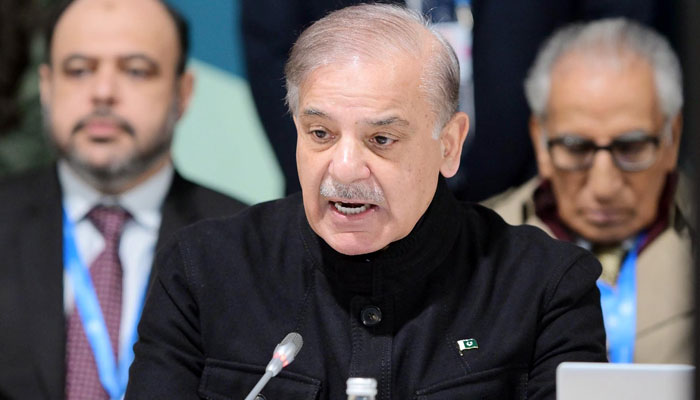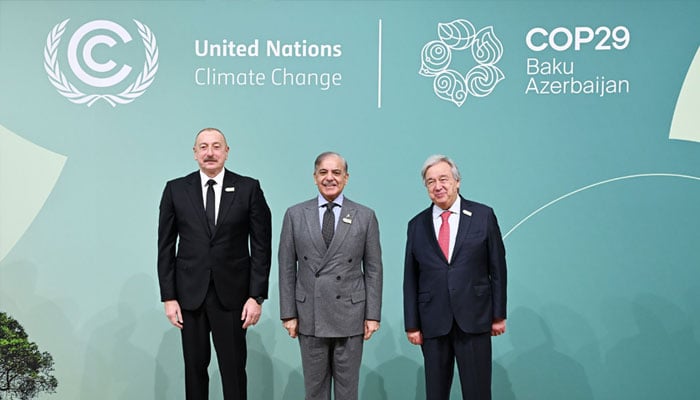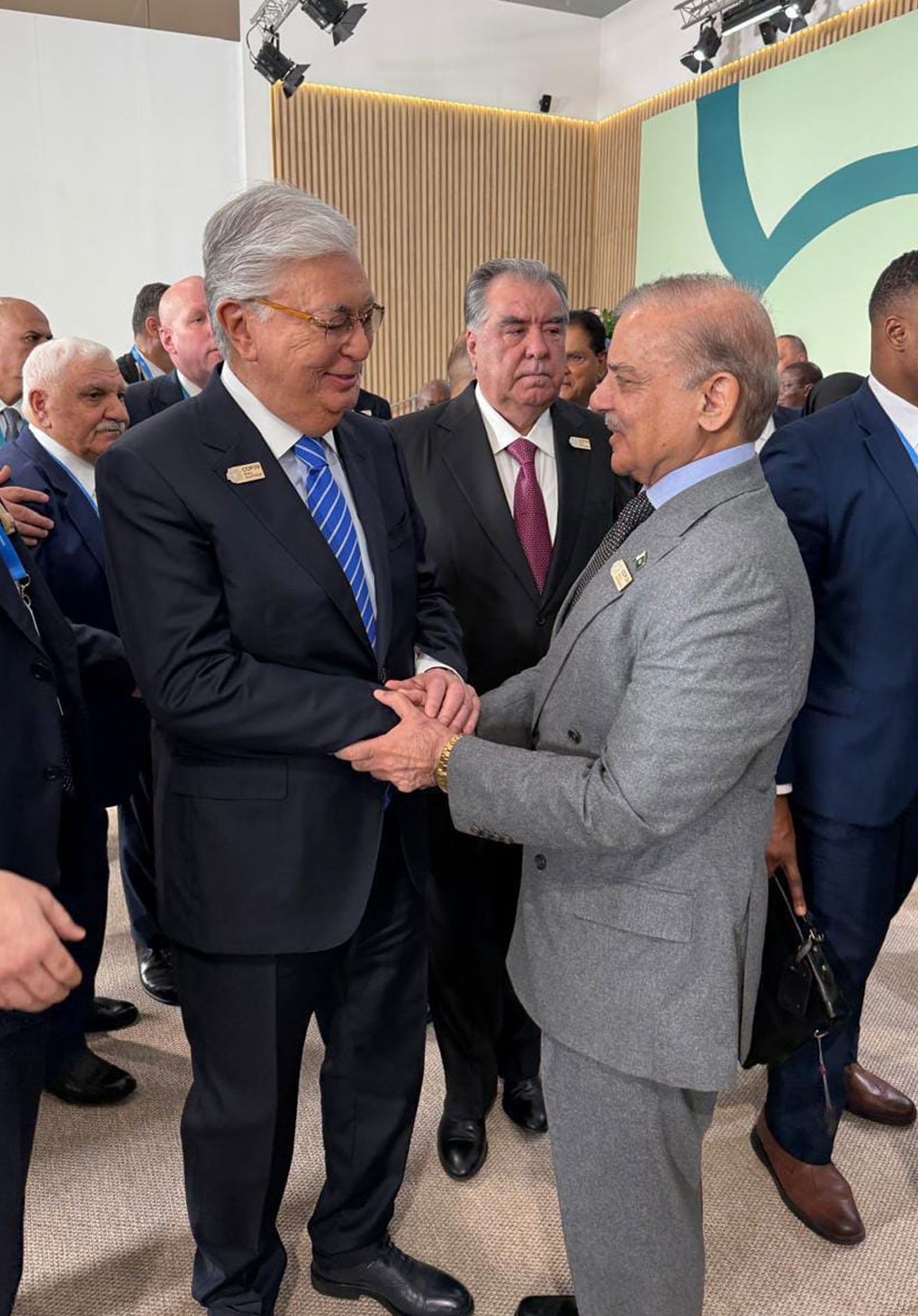'Need of the hour': PM urges increased climate financing for developing nations on COP29 sidelines
At roundtable conference, premier says global climate finance framework must be redefined to help vulnerable nations
Prime Minister Shehbaz Sharif on Tuesday called the climate financing an “urgent need of the hour”, saying that developing countries need an estimated $6.8 trillion by 2030 to implement less than half of their current Nationally Determined Contributions (NDCs).
The premier made these remarks during a Climate Finance Round Table Conference hosted by Pakistan on the sidelines of the two-day World Leaders Climate Action Summit, also known as COP29, being held in Baku, Azerbaijan.
While elaborating the purpose of the roundtable, PM Shehbaz briefed the participants that it was intended to foster new thinking on an old problem that was becoming complicated on all the international climate forums without yielding substantial results.
He emphasised the urgent need to build momentum for reforming international financial architecture, “forging a path where no nation is left behind in the global response to climate change.”
The premier noted that the developing countries needed to deliver to their masses on NDCs that was why it was imperative to spur both ideas and discourse to make international climate finance more responsive, equitable and sufficient enough to address solutions at various scale enhancing effectiveness of climate finance.
He underscored that the donor countries should fulfill their commitment to provide 0.7% of their gross national income as developing assistance and capitalise existing climate funds.
Furthermore, the prime minister said debt cannot become the “acceptable new normal” in climate financing which was why the world should focus on non-debt financing solutions enabling developing countries to fund climate initiatives without depositing an additional burden.
He explained that financing in the form of loans further enhance the debt of developing nations and potentially pushes them towards “mounting debt traps” which he referred to as “death traps”.
Pakistan can understand the agony and pain of other vulnerable developing countries as it had faced two devastating floods and still recovering from the loss, he said as he highlighted Pakistan’s recent experience with devastating floods.
“In order to spur some transparency and coordination into the financial commitments made to the developing countries on climate transfers, Pakistan alongside many other developing countries call for stronger, more equitable climate finance mechanisms under the UNFCCC,” he added.
He suggested a mechanism be set up to measure the unfulfilled pledges, fragmented at an incomplete landscape of climate funds to developing countries. “What I call INDCs whereby major historic emitters should account for climate finance commitments for both mitigation and adaptation pledges reflecting their proportionate responsibilities,” he added.
The prime minister also highlighted challenges to developing countries in embracing clean energy transition to offset their carbon emission from power sector.
He mentioned that the developing countries looking to enable energy transition should also get preferential capacity and technical assistance in fast tracking consortium financing through various financial instruments.
He suggested the UNFCCC to setup a committee to review internationally-determined contributions (IDCs) periodically.
On arrival at the summit venue, UN Secretary-General Antonio Guterres and President of Azerbaijan Ilham Aliyev welcomed the prime minister.
Later, he also posed for a family photo along with the participating leaders at the venue which followed the opening of the World Leaders Climate Action Summit.
Premier meets world leaders
As the participating leaders gathered for a group photo, PM Shehbaz held an informal interaction with them and exchanged pleasantries besides discussing matters of mutual interest.
PM Shehbaz interacted with United Arab Emirates (UAE) President Sheikh Mohamed bin Zayed Al Nahyan and discussed matters of mutual interest including bilateral cooperation in the climate change field.
During interaction with Turkish President Recep Tayyip Erdogan and Turkish First Lady Emine Erdogan, the two leaders discussed ways to cooperate in highlighting the issues of climate change and environmental pollution at the international level.
The premier also met with UK Prime Minister Sir Keir Starmer, where the two discussed enhancing Pakistan-UK cooperation.
In his interaction with Uzbek President Shavkat Mirziyoyev and Tajikistan President Emomali Rahmon, the leaders discussed protection of glaciers and water resources in Pakistan and Central Asia as well as the strengthening connectivity with both the countries.
In his meetings with Nepal’s President Ramchandra Paudel and Bangladesh’s Dr Muhammad Yunus, PM Shehbaz discussed growing temperatures, the threat of rising sea levels, and forest conservation in South Asia.
Meanwhile, he also interacted with Kazakhstan President Kassym-Jomart Tokayev and discussed strengthening bilateral relations and expanding regional connectivity.
Deputy Prime Minister and Foreign Minister Muhammad Ishaq Dar, Coordinator to Prime Minister on Climate Change Romina Khurshid Alam accompanied the prime minister.
PM links survival of humankind with 'compact health of glaciers'
Meanwhile, the prime minister also addressed a high-level event of Glaciers 2025; Actions for Glaciers, hosted by Tajik President Emamoli Rahmon.
He linked the survival of humankind on the planet earth with the compact health of glaciers, reiterating that Pakistan, being the most affected country, stood ready to work with the international community to protect these valuable natural resources.
PM Shehbaz called upon all the countries to unit in the efforts of protecting glaciers from pollution and snow melt by taking concrete and decisive actions to secure the future of glaciers as well as protect the mankind.
He said Pakistan was home to 7,000 glaciers which provided an approximately 60 to 70% water for the Indus River flow, supporting 90% of agriculture and serving its 200 million people.
“However the glaciers that provide water for this river have been shrinking over a period of time and at an alarming time, which is estimated at about 23% decrease since 1960,” he added.
The prime minister said this retreat was driven by rising temperatures and the consequences of these changes were glaringly visible.
He shared that accelerated glacial melt had led to the formation of more than 3,000 glacial lakes in the Northern Areas of Pakistan which were posing great threat. Out of these, he said, about 33 lakes were estimated at the risk of outburst flooding, putting lives of over 7million people in danger.
“This is a very grave situation and demands urgent action. Glaciers 2025 Initiative provides a unique opportunity; to focus on global attention on this crisis and drive the coordinated efforts to further stem the glacial melt,” he stressed.
He stressed that they must act and act now not only for these glaciers, but for the survival of people and the communities that depended upon them in various parts of the world.
The premier said Pakistan being the most affected country, required enhanced support to monitoring glacier health and early warning systems, adopt climate-resilient agriculture practices and invest in alternative water solutions.
-
Security forces gun down 30 terrorists in multiple IBOs in KP: ISPR
-
MQM-P calls for new province in Sindh
-
US report validates Pakistan military edge over India: PM
-
Banned TTP poses serious threat to Pakistan security: UNSC panel
-
CM Afridi clarifies remarks on by-poll after ECP requests army deployment
-
Dubai sees 3.2m Pakistani passengers in 2025 as airport sets new milestone
-
Security forces kill 23 Indian proxy terrorists in KP's Kurram
-
Pakistan to construct island to boost oil exploration: report
















